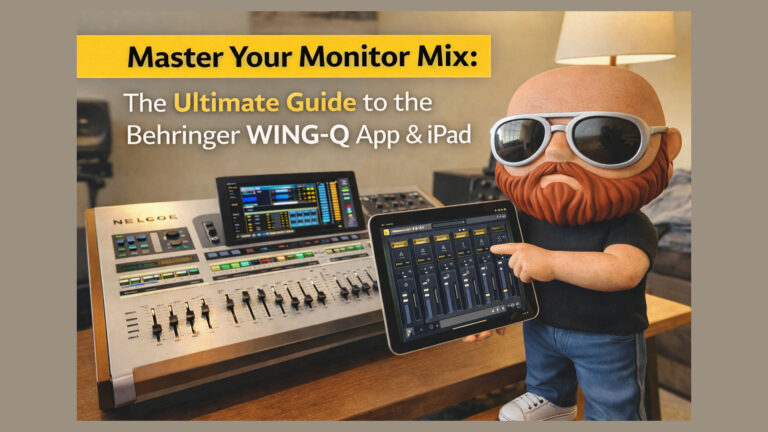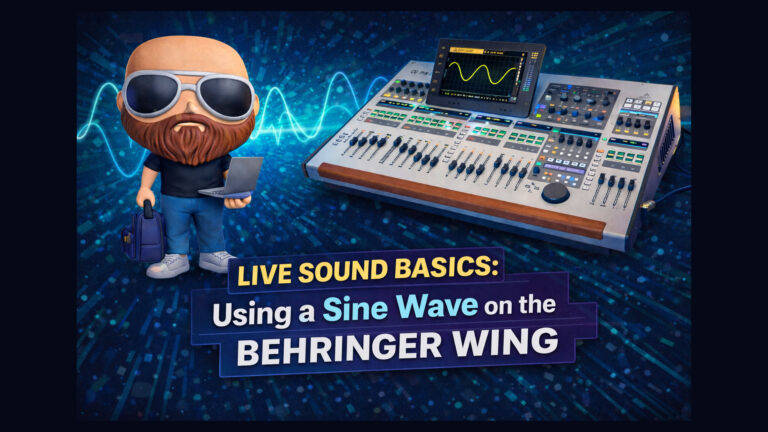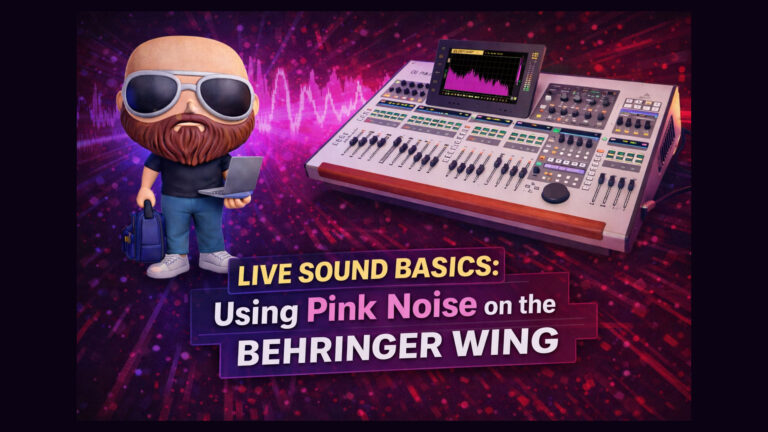Resources Available on this Page!
- Entire Console Snapshot Download (Plus Complete Walk through explanation)
- Channel Presets for the Behringer Wing
- Firmware Archives
- Guide to connecting multiple stage snakes
- Guide to using the P16 Personal Monitors with the Wing
Resources and Downloads
Click Here to download my wing console snapshot and view my in-depth walk through.
Click Here to download my wing console channel presets, and view my tutorial on using them.
*Affiliate Links (Help support my channel just by clicking and buying anything you need!)
Behringer Wing
Behringer DL32 Stage Snake
Wing Dante Card
USB Drives that work with the Wing – Option 1 | Option 2
View Recent Posts about Behringer Wing Below
-
Audio | Behringer Wing | Waves
Unlocking External Processing: A Beginner’s Guide to Waves SuperRack Performer with the Behringer Wing
Supercharge your Behringer Wing! Unlock the power of world-class Waves plugins for your live mix. This step-by-step guide demystifies Waves SuperRack Performer, covering everything from the USB connection to routing your first signal. Don’t miss out on this game-changing upgrade for your sound.
-
Master Your Monitor Mixes: A Step-by-Step Guide to Connecting the Behringer Wing with the Wing Q iPad App
Tired of endless “more me” requests from the stage? Empower your musicians with personal monitor control! This definitive guide walks you through connecting your Behringer Wing to an iPad using the Wing Q app. Create a better, stress-free mix environment for everyone. You won’t want to miss this.
-
Mastering Your Mix Remotely: A Step-by-Step Guide to Connecting the Behringer Wing with an iPad
Unleash the full power of your Behringer Wing! Stop being chained to the sound booth. This guide provides a step-by-step walkthrough for connecting an iPad via Wing Copilot, turning your tablet into the ultimate remote mixing surface. Your workflow will never be the same.
-
Getting Started with WingEdit for the Behringer WING: A Complete Setup Guide
Learn how to install and connect Behringer’s WingEdit software to your WING console for remote control, offline editing, and extended workflows. Ideal for worship tech setups, WingEdit enhances flexibility using a network-based connection and provides a virtual interface that mirrors and expands your live mixing capabilities.
-
Full Guide: Connecting Two Behringer Wing Consoles via AES50 and Stage Snakes
Learn how to connect two Behringer Wing mixers using AES50 and stage snakes without a Dante network. This step-by-step guide covers routing, clock settings, gain-sharing, and configuring signal paths between consoles for independent FOH and monitor or stream mixes.
-
Audio | Behringer Wing | Dante
How to Connect TWO Behringer Wing Consoles Using Dante – Live Stream & Monitoring Setup
This guide shows how to connect two Behringer WING consoles over Dante for independent house and live stream or monitor mixes. Learn to route, patch, and manage audio between consoles while maintaining gain awareness. Get maximum flexibility with minimum hardware—no analog splitting required.
-
Audio | Behringer Wing | Dante | Waves
Minimizing Latency with External Processing on the Behringer Wing: A/B Testing USB vs. Dante, Ableton vs. SuperRack Performer
This in-depth guide explores low-latency external processing on the Behringer Wing using a Mac Mini M1, comparing USB vs. Dante and Ableton Live vs. Waves SuperRack Performer. Step-by-step null testing reveals how processing chains, plugin selection, and routing methods impact latency for live sound environments with clear conclusions.
-
Audio | Behringer Wing | EQ
How To Generate and Route a Sine Wave Using the Behringer WING
Learn how to generate and route sine waves on the Behringer WING soundboard for system testing and troubleshooting. This step-by-step guide covers setting oscillator frequency, assigning it to channels, and adjusting tones in real-time—essential for live sound engineers in environments like churches, where precise signal control is critical.
-
Audio | Behringer Wing | EQ
How to Set Up Pink Noise on the Behringer WING for Room Tuning
Learn how to set up Pink Noise on the Behringer WING digital mixer. This guide walks you through assigning oscillators, routing pink noise to a channel, and using it for room equalization with external software and an SPL microphone for accurate sound system tuning.









